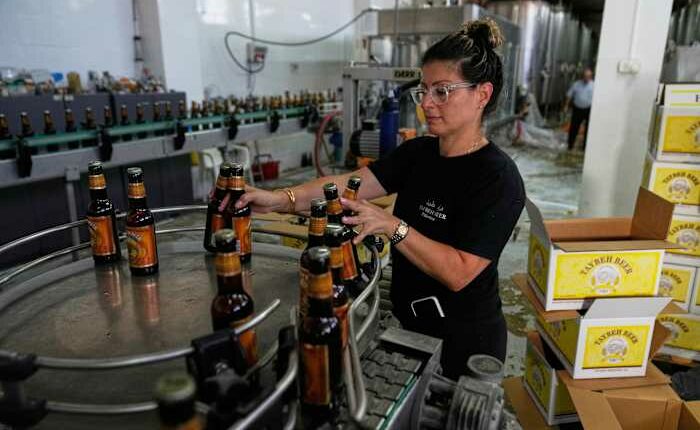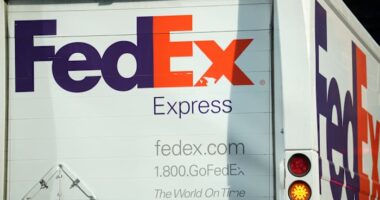Share this @internewscast.com

LONDON – This week, a Palestinian beer successfully reached British store shelves from the Israeli-occupied West Bank, overcoming stringent border checks, covering a distance of about 2,500 miles (4,000 kilometers), amidst an ongoing war in the region.
How it got here is a story of an unlikely bond between brewers in arms.
“My grandfather used to say, if you can make it succeed and happen in Palestine, you can succeed anywhere else in the world,” said Madees Khoury, the brewmaster at Taybeh Brewing Co. and daughter and niece of the founders. “Because of these challenges and obstacles that we go through — it just makes you stronger.”
The narrative of Taybeh Brewing Co. is one of repeatedly defying the odds.
Consider the basic facts: the company crafts and markets a microbrew among a largely Muslim populace that avoids alcohol for religious reasons. Add in continual conflict, water deficits, and Israeli settler incursions, and it’s almost miraculous that any beer production continues in the Christian village of Taybeh.
The business has struggled since Hamas militants killed 1,200 people in southern Israel and took over 250 hostage on Oct. 7, 2023, igniting a war resulting in more than 64,000 Palestinian deaths in the Gaza Strip.
Israeli military operations have intensified in the West Bank to address what it claims is a rising militant threat, though rights organizations accuse Israel of excessive force and the killing of innocent civilians. Settler violence has also escalated, including a recent incident involving the burning of a church in Taybeh.
A helping hand overseas
Enter Brewgooder, a Scottish company founded to make beer and do good, as its name implies.
Co-founder James Hughes read an article about Taybeh’s difficulties and proposed collaborating on a beer that could bypass checkpoints, boost sales, and generate funds for charity.
“I don’t think we’ve ever come across a brewery that has faced the hardship that Taybeh has,” Hughes said. “Traditionally collaborations are a celebration of fun and the sort of different styles and quirks that exist within the brewing industry. This one is just a completely different narrative and situation altogether.”
Taybeh, which was founded 34 years ago by Khoury’s father, Nadim, and her uncle, David, claims to be the oldest microbrewery in the Middle East.
Nadim Khoury likes to joke that the barriers they have to clear are what make its beer special.
“We have many problems in terms of culture, religion, occupation, siege, closures, the checkpoint, the port, the airport, electricity, shortage of water,” he said. “You name it, you can make a book out of the problems and the obstacles that we have.”
Israel captured the West Bank, east Jerusalem and the Gaza Strip in the 1967 Mideast war and Palestinians want all three territories for a future state. Israel’s current government is staunchly opposed to Palestinian statehood and supports eventual annexation of much of the West Bank.
Logistical headaches grow
Since the war began, the Israeli crackdown has hit the West Bank economy hard, forcing bars, restaurants and hotels to close. Festivals have been canceled. Unemployment has soared. The market for a product considered a luxury collapsed.
Israel also has ramped up security and imposed stricter controls at its borders, creating another high hurdle to exporting to the 17 countries, including the U.K., where Taybeh does business. All exports out of the West Bank must pass through Israeli crossings.
Even before the war, the Palestinian company had to deal with logistics that took its beer three days to reach port. Now the trip is chaotic and more expensive, requires excessive paperwork and must pass through a new third security check.
“I can tell you stories of the delays, what we’ve been through, and the nervous breakdowns, just doing our best to get the beer to our customers,” Madees Khoury said.
For instance, if scanning machines aren’t working, inspectors do a manual check and sometimes use dogs. If the dog spends too long in a truck, it triggers suspicions and further delays. One day, a dog urinated on cases of beer.
“My driver would send me pictures and he’s, like, ‘Look what happened?’” Madees Khoury said. “I don’t know what to do. How am I making a high quality product and then by the time it reaches my customer in Jerusalem it smells like pee?”
Profits return to the Middle East
The partnership with Brewgooder should prevent that scenario. There are certainly no border checks within the U.K.
Khoury and Hughes worked together to develop Sun & Stone, a crisp, Mediterranean-style lager brewed with Bavarian hops and British malt. They produced 180,000 cans that are about a pint (440 milliliters) each.
The Glasgow brewery and Co-op, which will sell the beer starting Wednesday in its 1,600 U.K. stores, are taking no profit. Proceeds from the sale will go to Taybeh to distribute among local charities and the Disasters Emergency Committee, which provides support to Gaza and Middle Eastern communities affected by conflict.
Hughes said the brewery’s mission is rooted in humanity and compassion and he hopes the collaboration will inspire others to help Palestinians.
“At the end of the day, we’ve just brewed a beer,” Hughes said. “You know, this isn’t getting on a boat and going to Gaza or all these incredible other initiatives that many thousands of people globally are now doing.”
___
Associated Press journalist Imad Isseid contributed from Taybeh, West Bank.
Copyright 2025 The Associated Press. All rights reserved. This material may not be published, broadcast, rewritten or redistributed without permission.











